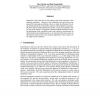Free Online Productivity Tools
i2Speak
i2Symbol
i2OCR
iTex2Img
iWeb2Print
iWeb2Shot
i2Type
iPdf2Split
iPdf2Merge
i2Bopomofo
i2Arabic
i2Style
i2Image
i2PDF
iLatex2Rtf
Sci2ools
NIPS
2001
2001
Correlation Codes in Neuronal Populations
Population codes often rely on the tuning of the mean responses to the stimulus parameters. However, this information can be greatly suppressed by long range correlations. Here we study the efficiency of coding information in the second order statistics of the population responses. We show that the Fisher Information of this system grows linearly with the size of the system. We propose a bilinear readout model for extracting information from correlation codes, and evaluate its performance in discrimination and estimation tasks. It is shown that the main source of information in this system is the stimulus dependence of the variances of the single neuron responses.
Related Content
| Added | 31 Oct 2010 |
| Updated | 31 Oct 2010 |
| Type | Conference |
| Year | 2001 |
| Where | NIPS |
| Authors | Maoz Shamir, Haim Sompolinsky |
Comments (0)

